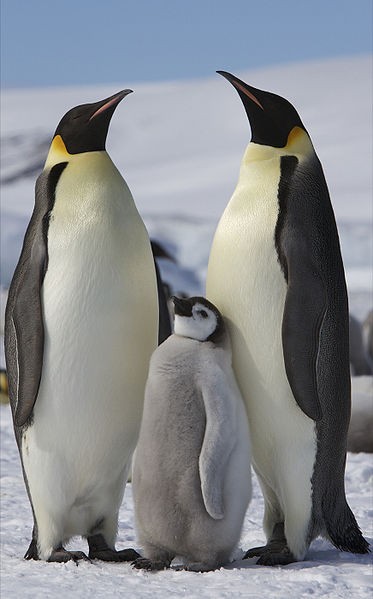Space Pictures Reveal More Emperor Penguins in Antartica [PHOTOS]
There are twice as many emperor penguins live in Antarctica than previously thought, according to a new report.
An international team of researchers led by British Antarctic Survey (BAS) have found that there are more than 590,000 birds, which are almost double the previous estimates of 270,000 to 350,000.
"We are delighted to be able to locate and identify such a large number of emperor penguins," said Peter Fretwell, researcher at the British Antarctic Survey, in a statement.
"This is the first comprehensive census of a species taken from space," he added.
The Emperor Penguin is one of the tallest and the heaviest among all the penguin species. They are around 4 feet in height and weigh around 30 to 40 kgs.
Emperor Penguin has short wings that help them to dive up to 900 feet to catch large fish. Though their primary food is fish, they are also fond of crustaceans and cephalopods. They can swim 10-15 kilometers an hour which lets them escape their main enemy, leopard seal.
Researchers used Very High Resolution (VHR) satellite images to calculate the population of penguin colony in Antarctica. With the help of the technique known as pan sharpening, scientists were able to differentiate between birds, ice, shadow and penguin.
The satellite images revealed seven new colonies which constituted to a total of 44 colonies along the Antarctic coast.
Researchers believe that this new method could help to monitor and keep track of other species in the Antarctic.
"The implications of this study are far-reaching: we now have a cost-effective way to apply our methods to other poorly-understood species in the Antarctic, to strengthen on-going field research, and to provide accurate information for international conservation efforts," the Vancouver sun quoted Michelle LaRue, researcher at the University of Minnesota, as saying.
These birds breed in areas that are very difficult to study because they are remote and often inaccessible with temperatures as low as -50°C (-58 degrees Fahrenheit).
The study also revealed those emperor penguins are seriously affected by global warming.
"Current research suggests that emperor penguin colonies will be seriously affected by climate change," said Phil Trathan, researcher at the British Antarctic Survey, in a statement.



© Copyright IBTimes 2025. All rights reserved.





















